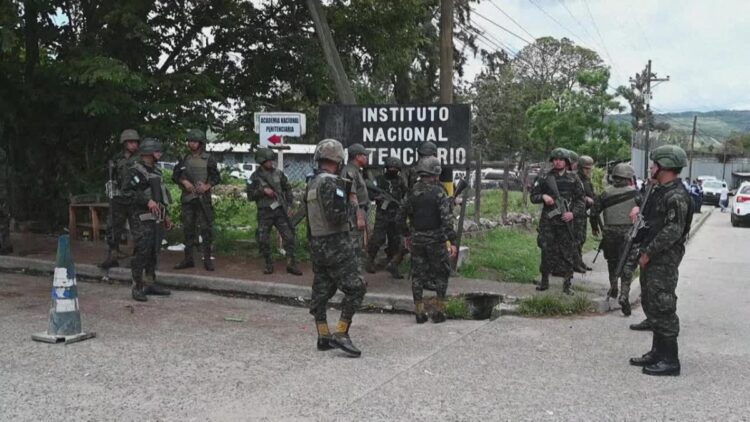At least 41 people were killed Tuesday at a women’s prison in Honduras, where violent clashes between rival gangs sparked a fire that tore through part of the facility, police said.
The deadly unrest rocked the prison some 25 kilometers (about 15 miles) north of the capital Tegucigalpa, according to police spokesman Edgardo Barahona, who put the “preliminary” death toll at 41 women, though it was unclear if they were all inmates.
Five other women were injured and taken to hospital, Barahona added.
Hundreds of relatives of incarcerated women gathered outside the detention facility awaiting information about their loved ones. “We don’t know who the victims are,” said one visibly distraught man.
Heavily armed soldiers and police were seen entering and guarding the prison, while firefighter teams were also on the scene.
According to Delma Ordonez, who represents inmate relatives, members of a gang had entered the cell of a rival group and set it on fire.
That part of the prison was “completely destroyed” in the blaze, she told media.
The CEFAS correctional facility in Tamara held some 900 inmates, said Ordonez.
Most of the victims died in the fire, while some bodies were riddled with bullets, a spokesperson for the prosecutor’s office, Yuri Mora, told AFP. An investigation was under way to determine which gang launched the initial attack, he added.
Honduran President Xiomara Castro said on Twitter she was “shocked” by the “monstrous murder of women in CEFAS by gangs in full view and tolerance of security authorities,” and expressed solidarity with grieving family members.
A state of emergency was announced, and Castro said she would hold security leaders to account for what happened.
“I will take drastic measures,” she said.
– ‘Narco-state’ –
Honduras is a country wracked by corruption and gangs that have infiltrated even the top levels of government.
Along with neighbors El Salvador and Guatemala, Honduras forms Central America’s so-called “triangle of death” plagued by the murderous gangs called “maras” that control drug trafficking and organized crime.
Drug trafficking groups and gang members are largely responsible for the soaring rate of homicides in Honduras, which at 40 murders per 100,000 inhabitants last year was four times higher than the world average.
Many young people have given up hope of a better future and think only of migrating to the United States.
Honduras is a major transit country for Colombian cocaine and other narcotics headed mainly to the United States.
Former Honduran president Juan Orlando Hernandez was extradited to the United States on drug charges in April 2022 — just over a year after his brother Tony was sentenced in New York to life in prison.
US prosecutors say Hernandez turned Honduras into a “narco-state” involving the military, police and civilians in drug trafficking.
In May last year, former national police chief Juan Carlos Bonilla was also sent to the United States to stand trial for allegedly supervising drug trafficking operations on behalf of his boss, Hernandez.
Castro, the country’s new leftist president, has vowed to tackle criminal gangs, last year temporarily lifting certain constitutional guarantees to allow police to make arrests without warrants.
One objective of the crackdown, Castro said, was to rein in rampant exortion by gangs, which she described as “one of the main reasons for migration and the shuttering of small and medium enterprises” in Honduras.
nl/dga/mlr/mlm/jh
[ad_2]
Source link







